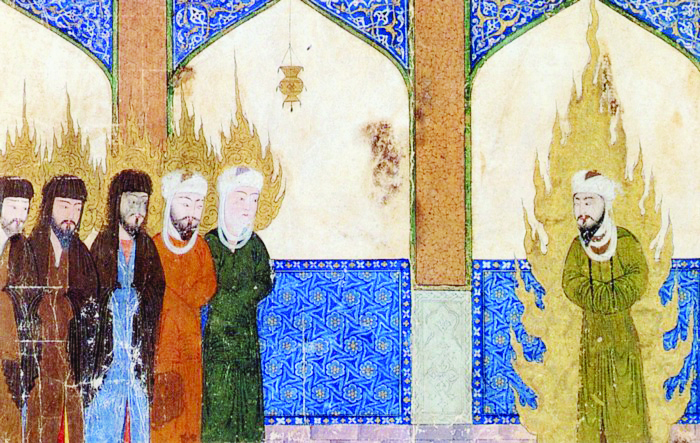By Richard Lawson Singley
Before Islam, the Arabian Peninsula was a region torn by centuries of tribal warfare. Before the birth of Muhammad, its people were aware of both Jewish and Christian faiths, yet they embraced neither. They were, however, painfully aware that their God, Allah, had never sent them a revelation or a prophet of their own.
Early Islam
Some Arabs that encountered Jews and Christians began to feel that God had left them out of His divine plan because they had not received a revelation that spoke specifically to them. However, all of that changed on the 17th night of Ramadan in the year 610 CE when Muhammad (570–632) received his first revelation. While sleeping in a mountain cave, he was visited by the angel, Gabriel that commanded that he recite (igra).
The summons to his mission as a prophet is known in Islam as Laylat Al Qadr (the Night of Power). Like so many prophets before him, Muhammad did not think he was worthy. The word of God had been spoken for the first time in the native Arabic language and the holy book would be called the Koran (the Recitation). Four the remaining twenty-two years of his life, Muhammad continued to receive revelations.
Muhammad was one of the most astonishing historical figures in world history. Born Muhammad ibn Abdullah in Mecca around 570 CE, he was orphaned at the age of two and was raised by his uncle Abu Talib. He married a rich widow named Khadijah and together they had four daughters: Umm Kulthum, Ruqayah, Zainab, and Fatimah. Khadijah was the first convert to Islam, and as a result, she is highly revered.
Muhammad’s leadership can be divided into two periods: The Mecca years (610–622) and the Medina years (622–632). It was in 622 that a small community of Muslims migrated from Mecca to Medina. This is known as Hijrah and marks the turning point in the development of Islam.
The year, 622, is the first year of the Muslim calendar. Although, Mecca is the holiest city within Islam, Medina and Jerusalem (where Muhammad ascended to heaven on his Night Journey) are also sacred to Islam. During his lifetime, he was able to communicate a religious vision that united not only his people but people around the world. The religious scholar Karen Armstrong in her book Muhammad explains:
If we view Muhammad as we do any other important historical figure, we would surely consider him to be one of the greatest geniuses the world has known. To create a literary Masterpiece, to found a major religion and a new world power are not ordinary achievements. But to appreciate his full genius we must examine the society into which he was born and the forces which he contended. When he descended from Mount Hira to bring the Word of God to the Arabs, Muhammad was about to attempt the impossible…….. Yet, Muhammad set out to make the Arabs achieve this major change in a mere twenty-three years!
Although Muhammad was an extremely charismatic and gifted person, he never professed to be a god in any way but rather, the Messenger of God. Nor did he profess to perform miracles such as raising people from the dead. Even though his name is perhaps the most popular in the world, the religion does not bear his name and he is subordinate to the Koran and Islam.
Muslims believe that the Koran was revealed to the Prophet Muhammad in a series of chapters (suras) and organized according to length with the longest first and the shortest last. The shorter suras are from the Mecca years. It was in 630 that Muhammad led his forces against Mecca and from 630 to 632 the remaining tribes of Arabia accepted Muhammad’s mission and the Islamic faith. The life and achievements of Muhammad would change the lives of Muslims forever and leave an engrained mark on human history for centuries after his death.
The holy book that he left, the Koran, is the fruit of Islam that nourishes nearly a billion people every day. Islam, like Judaism and Christianity, is a monotheistic religion that claims Abraham as its primogenitor through his son Ismael. Most scholars agree that the Jewish and Christian faiths had a profound influence on Islam; and Muslims refer to them as People of the Book. Many of the Prophets of the Old Testament are in the Koran, e.g., Adam, Noah, Isaac, Joseph, Moses, David, Solomon, Jonah, and John (the Baptist); and Christians would be surprised to find how many times Jesus (Isa) and Mary (Maryam) are mentioned in the Koran. Moreover, the Koran contains a chapter, 19, Surah Maryam, that is named after Mary. The Following are used as sources for guidance within Islam:
Koran (Qur’an): The Word of God as revealed to the Prophet Muhammad
Hadith: Authenticated sayings of the Prophet Muhammad
Ijma: A consensus among Islamic scholars
Qiyas: Analogical reasoning
Ijtihad: Continual scholarly interpretation
There are five things or pillars that are incumbent upon every Muslim:
1) Shahadah: I testify that there is no God but God and Muhammad is the messenger of God
2) Salat: Prayer (five times a day in the direction of Mecca)
3) Zakat: Charity
4) Sawm: Fasting (observed during the month of Ramadan)
5) Hajj: Pilgrimage. (once in a lifetime on a Pilgrimage to Mecca)
The following are among the top sacred sites to all Muslims:
The Kaaba Masjid al-Haram (Toward which Muslim should face when praying anywhere in the world)
Courtesy: richardsingley.medium.com
